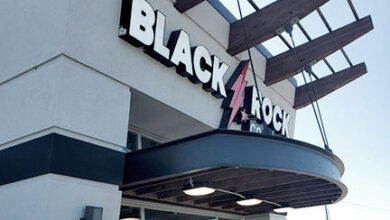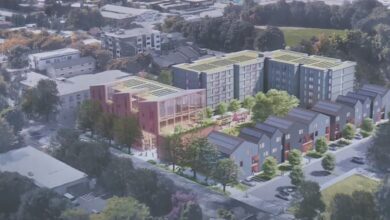Golden West Hotel, Portland’s ‘Black cultural hub’ before falling into disrepair, makes case for national recognition

The U.S. Custom House is on the National Register of Historic Places. So is the Sengstake Building.
The Golden West Hotel, which stands directly across a street from each of those buildings (and is older than both), is not.
One reason for this: The Golden West hid in plain sight for years.
The Portland building, at Northwest Broadway and Everett, catered almost exclusively to Black guests in the early 1900s, a time when people of color weren’t welcome in much of the city. In a very real sense, it was an unseen place, one that most Portlanders — as well as the city’s chroniclers — didn’t want to know about.
And yet the Golden West was hard to miss.
Rising five stories on a main boulevard, with striking dormer windows at the top, it was the largest, most luxurious, Black-operated hotel in the country, surpassed later only by New York’s Hotel Theresa, “the Waldorf of Harlem.”
The Golden West, which the City of Portland recently nominated for inclusion on the national register along with two other buildings important to Portland’s Black history, initially served a small but important niche: railroad workers.
The railroad companies didn’t provide accommodations for their Black employees during layovers, and neither did most professional hotels along the rail routes.
William Duncan Allen, born in Nashville in 1875, had been one of those railroad men. He didn’t like how inhospitable Portland was to people of color — Oregon’s early, racist exclusion laws were one reason the city’s Black population numbered only in the hundreds at the turn of the century — and he wanted to do something about it.
Allen started his Portland entrepreneurial career with a café. Then, when a hotel situated just five blocks from Union Station became available in 1905, he worked out a way to take charge of it — despite laws and common social practices that made it nearly impossible for Black people to run legitimate businesses in the state.
The hotel had gone up just over a decade earlier, built by white developers, with the expectation that it would serve only white guests.
The Hibbard Bros. called the building Tremont House, the same name as a well-known Boston hotel.
“A splendid opportunity is offered some good hotel man, or someone who is desirous of embarking in the hotel business, to obtain a new house, located in a growing part of the city,” the company stated in an 1893 Portland newspaper ad. The notice heralded the building as “an elegant new brick structure … The rooms are all light and airy, there are toilet rooms on each floor, and the entire house is heated by steam. Electric bells in all rooms. The new customhouse is to be built directly opposite this house.”
But the ambitious development came online just as a national financial crisis hit — and as the hotel’s neighborhood was becoming the center of Portland’s small, ostracized Black community.
The property floundered, and the bank repossessed Tremont House only five years after it opened.
This eventually allowed Allen to lease the building, now renamed the Golden West. He would refashion it into the only hotel in Portland that served Black people.
“He saw there was a need,” says Kimberly Moreland, who owns Moreland Resource Consulting and is president of the historical society Oregon Black Pioneers. “He saw he had an incredible opportunity to make an impact on his community.”
That incredible opportunity certainly didn’t mean it came easily.
Portland was a segregated city, actively hostile to people of color. That meant any Black man out on the street felt the threat of an impromptu beating. It meant the few businesses run by or for Black people faced the very real possibility of arson.
And then there were always assumptions about what they really were up to.
The Oregonian in 1907 suggested that the newly relaunched Golden West was a brothel “masquerading as a family hotel.” The newspaper’s pronouncement came from “gossip in police circles,” rather than arrests, trial testimony or on-the-scene reporting.
To be sure, the goings-on at the hotel were not beyond reproach. A large gambling operation would be established in the basement, and the police did end up making prostitution arrests at the hotel, raiding the building four times in five weeks following that damning initial newspaper article. (The city’s papers luridly tracked such raids, labeling an alleged prostitute named Emma as the “vampire of the Golden West hotel.”)
Yet the Golden West unquestionably was a family hotel.
The late journalist and social worker Kathryn Hall Bogle, an adolescent during the Golden West’s 1920s heyday, recalled that the hotel’s restaurant would be “swamped with customers all of a sudden every Sunday” after church services let out. Laughter bounced around the lobby as families waiting to eat talked about “plans for the coming week, just a general get-together, socializing.”
Whether one went there to socialize after church or just maybe to spend time with a woman “of ill-repute,” the Golden West from the very start of its existence was much more than a place for Black railroad men to lay their heads for a night.
William Duncan Allen “helped provide entertainment and a social life for African Americans who otherwise were not allowed,” Moreland says.
He and his hotel were “very well-respected,” she adds. (The lieutenant who led the Portland police “morals squad” eventually would admit in court that he had “heard virtually the same things concerning immorality in most of the hotels in the city, including some of the best,” that he had heard about the Golden West.)
Along with a popular restaurant (a full meal cost 25 cents when the hotel opened in 1906), the Golden West housed a barber shop, a confectionary, a Turkish bath and an athletic club. Former World Colored Heavyweight champion “Denver Ed” Martin, who had lost his title to the legendary Jack Johnson, worked in the club. Traveling jazz bands regularly played — and spent the night — at the hotel.
Vaudeville star Bill “Bojangles” Robinson stayed at the Golden West. So did A. Philip Randolph, the powerful leader of the railroad-porters union, and Illinois U.S. Rep. Oscar Stanton De Priest, the only Black member of Congress at the time.
“The Golden West Hotel really was a Black cultural hub,” Moreland says.
This is the backbone of the property’s case for national historical recognition. The building itself is “interesting,” the national register nomination notes, with its “stripped-down” French Renaissance Revival style. But it’s not architecturally special.
The typical building on the national register is there because it’s “a pure expression of when it was built,” says Brandon Spencer-Hartle, the historic-resources manager for Portland’s Bureau of Planning and Sustainability, who has helped lead the effort to place the Golden West on the national protected list. “But there aren’t a lot of places that have been recognized for social, cultural, ethnic or community importance.”
Moreland says that focusing on cultural and community value, rather than architecture and engineering, is “kind of an equity issue.”
Wealthy Americans, she points out, always have been able to hire renowned architects to create innovative, era-defining buildings and then make those soaring dreams happen. Civic leaders and entrepreneurs in low-income, minority communities, often facing discriminatory lending practices, settled for “more humble buildings, places they could afford.”
Moreland, as part of a team of historians and city bureaucrats, documented the history of the Golden West and other buildings key to Portland’s Black experience for the National Register of Historic Places submissions.
In 2020, the city filed a nomination for the 1926 Billy Webb Elks Lodge, in Northeast Portland, as a “proof of concept.” The National Park Service, which administers the national register, quickly embraced it. The city then followed with nominations for the Golden West as well as Dean’s Beauty Salon and Barber Shop, on Northeast Hancock Street, and Mt. Olivet Baptist Church, which started out in a small, nondescript space next to the Golden West before building its own place in North Portland in the 1920s.
Congressman Earl Blumenauer, from Oregon’s 3rd District, has thrown his support behind the nominations. In a letter to Secretary of the Interior Deb Haaland, he called the buildings “landmarks” that “demonstrate the resilience of Portland’s Black community.”
The park service is expected to make its decisions on the three latest submissions this spring.
Dean’s Beauty Salon and Mt. Olivet Church are still very much with us and going strong. But the Golden West Hotel closed in 1930, a victim of the Great Depression and the Black community’s migration across the river to Northeast Portland. Allen opened another, smaller place on North Interstate Avenue, Hotel Medley, named in memory of his wife Lillian Medley, who died in 1924 at just 46, not long after their musical-prodigy son William Jr. left Oregon for the Oberlin Conservatory of Music.
William Duncan Allen Sr. died in 1949, at 73, in his adopted hometown of Portland.
Four years later, the Oregon Legislature finally made it illegal for hotels and restaurants to turn away people on the basis of race, though widespread acceptance of the law would be slow to follow.
In 1956, only three establishments in all of Oregon — one of which was Hotel Medley — were in the Green Book, the annual guidebook listing places throughout the U.S. that would provide accommodations to Black travelers. (Idaho had seven listings, California more than 60.)
The Portland building at Broadway and Everett streets that Allen had operated for 25 years early in the century — and made central to Black life in the city — took on different uses in the decades after the Golden West closed.
A group called Friends of the Golden West attempted to raise awareness of the building’s history, with Bogle, one of its members, lamenting that it had become “shabby and run-down.”
The building was renovated in the 1990s and the Golden West name restored. (It had been called the Broadmoor for years.) The nonprofit housing organization Central City Concern operates the property.
Even now, few of the Portlanders who pass by the unassuming building on any given day realize the unique and powerful history that it holds.
“That’s what is really exciting about these nominations,” Spencer-Hartle says. “They’re really looking to document and to celebrate the cultural importance of places, not just that sort-of obvious architectural story.”
He adds:
“They’re more about the story than about the physical objects.”
Samantha Swindler contributed to this report.
— Douglas Perry























































